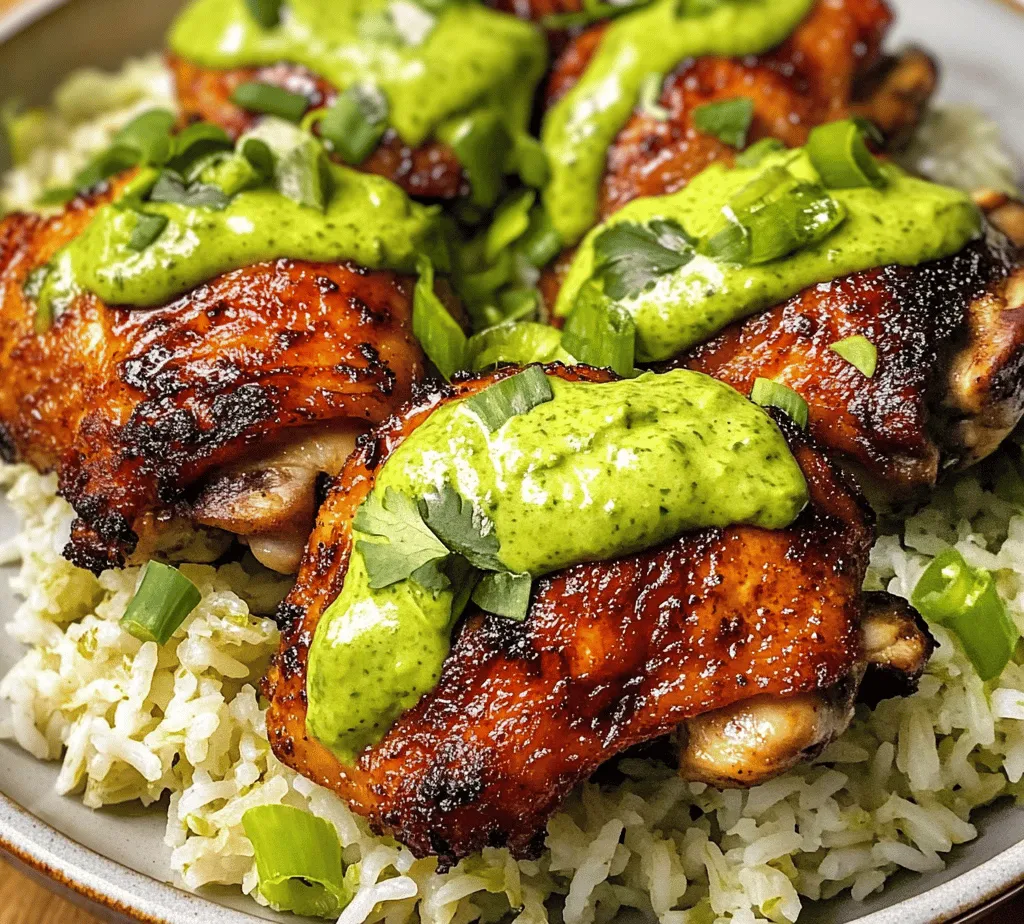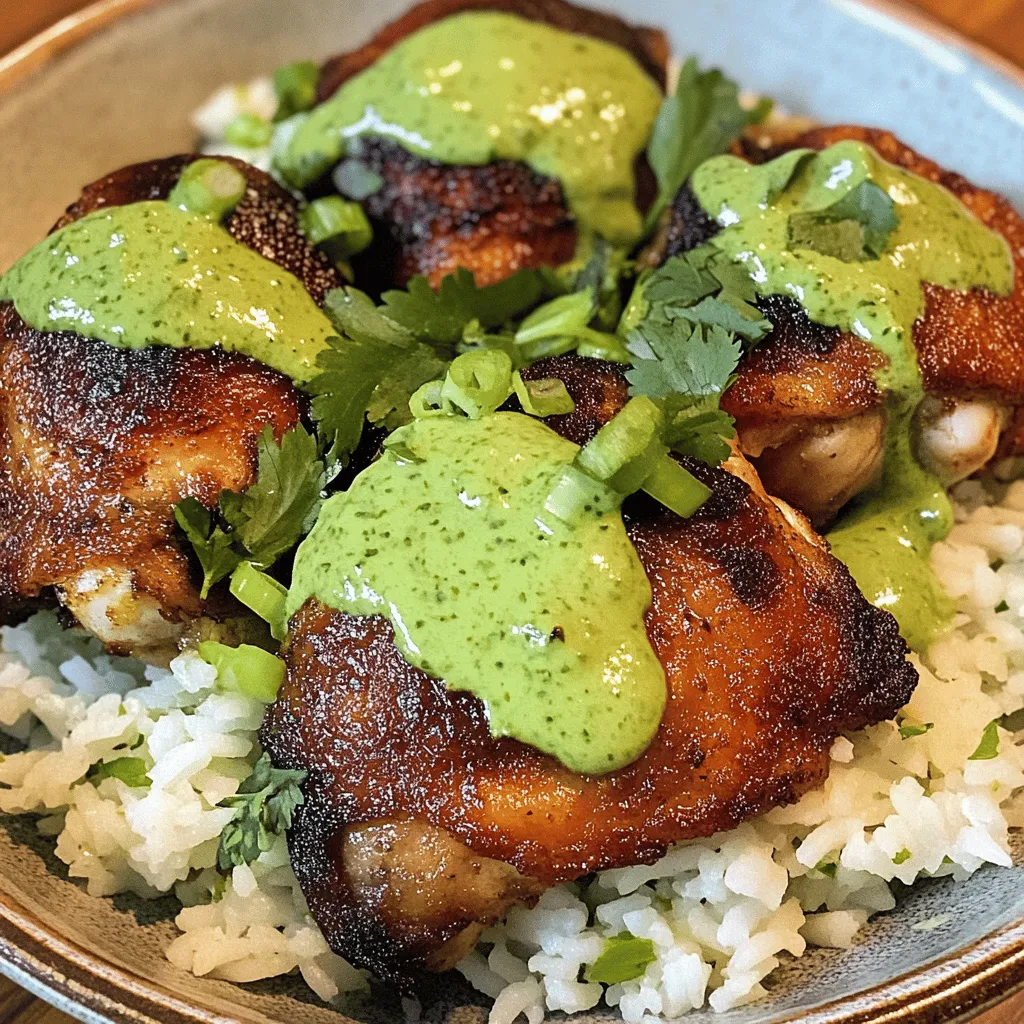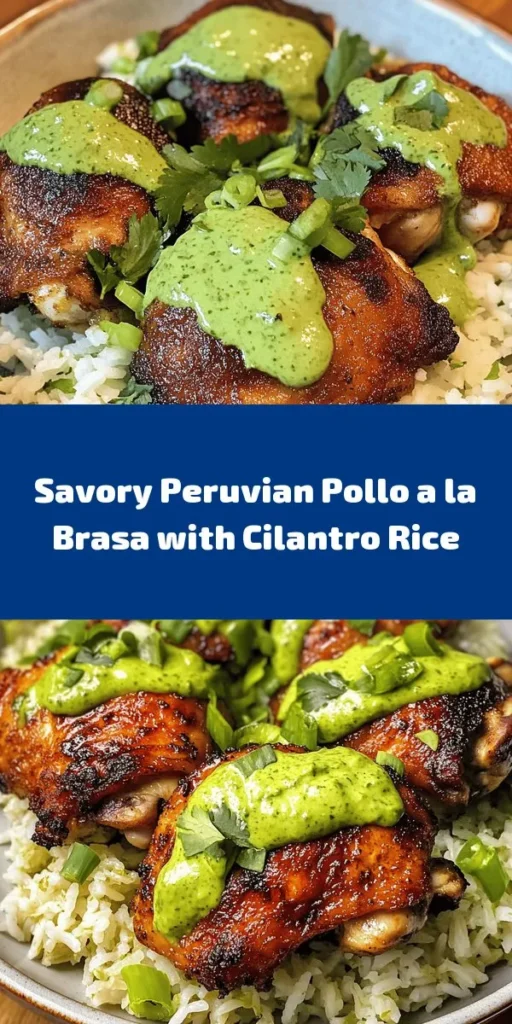Introduction
Peruvian cuisine is rapidly gaining recognition around the world for its vibrant flavors and unique culinary techniques. The blending of indigenous ingredients with Spanish, African, and Asian influences has created a culinary landscape that is both diverse and rich. One of the standout dishes that encapsulates the essence of Peruvian cooking is Pollo a la Brasa, or Peruvian roasted chicken. This beloved dish is not just a staple at family dinners but also a popular choice at restaurants and street food stalls throughout Peru.
Pollo a la Brasa is known for its succulent, marinated chicken that is roasted to perfection, resulting in a crispy exterior and juicy interior. When paired with fragrant cilantro verde rice and a zesty green sauce, this dish becomes a flavor-packed meal that is sure to impress. The combination of spices used in the marinade, along with the aromatic rice and spicy sauce, creates a delightful fusion of flavors that is emblematic of Peru’s culinary artistry.
In this article, we will explore the cultural significance of Pollo a la Brasa, delve into its flavorful ingredients, and provide you with a step-by-step guide to preparing this iconic dish alongside cilantro verde rice. Whether you’re an experienced home cook or a culinary novice, this recipe promises to transport you to the heart of Peru with every bite.
Understanding Pollo a la Brasa
Origins and Cultural Significance
Pollo a la Brasa, which translates to “grilled chicken,” has deep roots in Peruvian culture. The dish originated in the mid-20th century in Lima, where it was popularized by local restaurants that embraced the cooking methods brought over by European immigrants. Over the years, it has evolved into a national treasure, often enjoyed during celebrations, family gatherings, and casual meals alike. The dish’s popularity has also spread beyond Peru, making it a favorite among food enthusiasts around the globe.
At its core, Pollo a la Brasa is more than just a meal; it represents the warmth of Peruvian hospitality and the joy of sharing good food with loved ones. The preparation of this dish involves skillful marination and roasting, which highlights the importance of flavor in Peruvian cooking.
The Role of Marination in Enhancing Chicken Flavor
Marination is a crucial step in the preparation of Pollo a la Brasa, as it infuses the chicken with a depth of flavor that is both aromatic and savory. The marinade typically consists of a blend of spices, vinegar, and lime juice, each playing a vital role in tenderizing the meat and enhancing its taste. The longer the chicken marinates, the more intense the flavor becomes, making this step essential for achieving that signature taste.
Importance of Cooking Methods: Roasting vs. Baking
The cooking method used for Pollo a la Brasa significantly impacts the final result. While roasting is traditional, baking can also yield delicious results. Roasting allows the chicken to develop a crispy skin while the meat remains juicy and tender. The use of a rotisserie or a charcoal grill is common, as they impart a delightful smokiness that elevates the dish. If you’re using an oven, it’s important to replicate the high heat and direct heat of a grill to achieve that classic, charred flavor.
Ingredients Breakdown
Key Ingredients for the Chicken Marinade
The magic of Pollo a la Brasa lies in its marinade, which typically includes the following key ingredients:
– Garlic Powder: Adds an aromatic depth that enhances the overall flavor.
– Paprika: Introduces a subtle smokiness and vibrant color to the chicken.
– Cumin: A staple in Peruvian cooking, cumin adds an earthy dimension to the dish.
– Black Pepper: Provides a mild heat that complements the other spices.
– Lime Juice: Not only does it tenderize the chicken, but it also brightens the flavors of the marinade.
Each of these ingredients contributes to the unique taste of Pollo a la Brasa, creating a well-rounded and deeply flavorful dish.
Importance of Lime Juice
Lime juice serves a dual purpose in this recipe. First, its acidity breaks down the proteins in the chicken, resulting in a more tender texture. Second, it infuses the meat with a fresh, zesty flavor that cuts through the richness of the marinade. This balance of flavors is essential in Peruvian cuisine, where bright, fresh ingredients often complement richer elements.
Ingredients for Cilantro Verde Rice
Cilantro verde rice is a fragrant accompaniment that enhances the overall meal experience. The main ingredients for this dish include:
– White Rice: The base of the dish, providing a neutral canvas for the flavors.
– Chicken Broth: Using chicken broth instead of water elevates the flavor profile, infusing the rice with a savory depth.
– Fresh Cilantro: This herb is the star of the dish, adding a burst of freshness and color.
– Green Onions: These provide a mild onion flavor and a crunchy texture that complements the rice.
The combination of these ingredients creates a vibrant, aromatic rice dish that pairs perfectly with the marinated chicken.
The Role of Fresh Herbs
Fresh herbs like cilantro and green onions are essential components of both Pollo a la Brasa and cilantro verde rice. They not only add flavor but also contribute to the visual appeal of the meal. The bright green of the cilantro against the white rice creates a striking contrast, making the dish as beautiful as it is delicious.
Components of the Green Sauce (Aji Verde)
The green sauce, known as Aji Verde, is a signature condiment that accompanies many traditional Peruvian dishes. Its ingredients typically include:
– Fresh Cilantro: The primary base of the sauce, providing a fresh and vibrant flavor.
– Jalapeño or Serrano Peppers: Adding heat and depth to the sauce.
– Garlic: Enhancing the overall flavor profile.
– Mayonnaise or Greek Yogurt: These ingredients bring creaminess to the sauce, balancing the heat from the peppers.
Aji Verde is a versatile sauce that can vary in heat and creaminess, depending on personal preference. It serves as a perfect complement to the roasted chicken, adding an extra layer of flavor that brings the entire dish together.
Variations of Aji Verde
Different regions in Peru put their own spin on Aji Verde, resulting in a variety of flavors and textures. Some variations may include additional ingredients like avocado or lime zest, which can enhance the creaminess or add a citrusy brightness. Regardless of the variation, Aji Verde remains a beloved staple in Peruvian dining, often served alongside not just Pollo a la Brasa, but also with grilled meats, seafood, and even as a dipping sauce for fried appetizers.
Step-by-Step Instructions for Pollo a la Brasa
Marinating the Chicken
1. Prepare the Marinade: In a bowl, combine garlic powder, paprika, cumin, black pepper, and lime juice. Mix well until you have a smooth paste.
2. Marinate the Chicken: Rub the marinade all over the chicken, ensuring it is evenly coated. For best results, place the chicken in a resealable plastic bag or a covered dish, allowing it to marinate in the refrigerator for at least 4 hours, or ideally overnight. This marination time allows the flavors to penetrate deeply into the meat, ensuring a flavorful outcome.
3. Prepare for Cooking: When ready to cook, preheat your oven or grill. If using an oven, set it to a high temperature (around 425°F to 450°F). For grilling, prepare your charcoal or gas grill for direct heat cooking.
Preparing Cilantro Verde Rice
1. Cook the Rice: Rinse the white rice under cold water until the water runs clear. This step removes excess starch, preventing the rice from becoming gummy.
2. Simmer with Broth: In a medium saucepan, combine the rinsed rice and chicken broth. Bring to a boil, then reduce the heat to low, cover, and let it simmer for about 15-20 minutes, or until the rice is tender and has absorbed the liquid.
3. Mix in Fresh Herbs: Once the rice is cooked, fluff it with a fork and stir in chopped fresh cilantro and sliced green onions. This addition not only enhances the flavor but also adds a pop of color to the dish.
By following these initial steps, you will be well on your way to creating a delicious Peruvian Pollo a la Brasa with cilantro verde rice. This dish is not only a feast for the senses but also a celebration of the rich culinary heritage of Peru. Stay tuned for the next part of this article, where we will cover the cooking techniques for the chicken and the finishing touches for your meal.

Techniques for Rinsing Rice and Toasting for Better Texture
Rinsing rice is an essential technique that significantly enhances the final texture of the dish. To begin, measure the desired amount of rice and place it in a fine-mesh strainer. Rinse the rice under cold running water, gently stirring with your fingers to ensure all grains are thoroughly rinsed. This process removes excess starch, which can lead to sticky rice. Rinse until the water runs clear, indicating that most of the starch has been washed away.
Toasting the rice before cooking adds a nutty depth of flavor. After rinsing and draining, place the rice in a dry saucepan over medium heat. Stir continuously for about 3-4 minutes until the rice turns slightly golden and fragrant. This step not only enhances the flavor but also contributes to a firmer texture, as the toasted grains will hold their shape better during cooking.
Cooking Methods to Achieve Fluffy Rice
To achieve fluffy rice, the cooking method is crucial. After toasting, add the appropriate amount of water or broth to the saucepan, typically a ratio of 1 part rice to 1.5 parts liquid. Bring the mixture to a boil, then reduce the heat to low and cover the pot with a lid. Allow the rice to simmer without lifting the lid for about 15-20 minutes. This steam-cooking method is vital to allow the rice to absorb moisture evenly.
Once the cooking time is up, remove the pot from heat and let it sit, covered, for an additional 5-10 minutes. This resting period allows the grains to firm up and absorb any remaining moisture, resulting in perfectly fluffy rice. Finally, fluff the rice with a fork before serving to separate the grains.
Creating the Green Sauce
The vibrant green sauce, or “salsa verde,” is a hallmark of Pollo a la Brasa. To create this refreshing condiment, gather fresh cilantro, jalapeño or serrano peppers (for heat), lime juice, garlic, and mayonnaise. Begin by adding the cilantro and peppers to a blender or food processor. The amount of pepper can be adjusted based on your spice tolerance—start with one and increase if you prefer more heat.
Add a clove of garlic, the juice of one lime, and a couple of tablespoons of mayonnaise for creaminess. Blend the mixture until it reaches a smooth consistency. If the sauce is too thick, you can add a splash of water to achieve your desired texture. Taste and adjust the seasoning by adding salt, lime juice, or more peppers as needed.
Blending Tips for Achieving the Perfect Consistency
Achieving the right consistency for your green sauce is crucial. Begin by pulsing the ingredients in the blender to break them down, then gradually increase the speed. If you find that the mixture is not blending smoothly, pause and scrape down the sides of the blender with a spatula to ensure all ingredients are well incorporated.
For a more pronounced flavor, let the sauce sit in the refrigerator for at least 30 minutes before serving. This resting time allows the flavors to meld beautifully, enhancing the overall taste. The sauce can be stored in an airtight container in the refrigerator for up to a week, making it a convenient addition to various dishes beyond Pollo a la Brasa.
Cooking Techniques for Perfect Chicken
To achieve the iconic crispy skin of Pollo a la Brasa, proper oven preparation is essential. Preheat your oven to 425°F (220°C). This high temperature is key to rendering the fat beneath the skin and achieving that coveted crispy exterior.
When it comes to cooking the chicken, a baking sheet lined with parchment paper is your best friend. This not only makes for easy cleanup but also allows the chicken to roast evenly. Place the marinated chicken pieces on the baking sheet, ensuring they are not overcrowded. Crowding can lead to steaming rather than roasting, which compromises the skin’s crispiness.
For optimal cooking, roast the chicken for 45-50 minutes, basting it halfway through with the remaining marinade to enhance flavor and moisture. Use a meat thermometer to ensure the chicken reaches an internal temperature of 165°F (74°C) for safety while keeping the meat juicy.
Finishing Touches on Cilantro Verde Rice
After cooking the rice, the finishing touches can elevate the dish. To fluff the rice, use a fork to gently separate the grains. This technique prevents clumping and enhances the overall presentation. For added flavor, finely chop green onions and fresh cilantro, folding them into the rice just before serving. This not only adds a burst of color but also reinforces the fresh herbaceous notes that complement the chicken.
Serving Suggestions
Presentation plays a vital role in making your Pollo a la Brasa visually appealing. Consider serving the chicken on a large platter, garnished with lime wedges and fresh herbs for a pop of color. The bright green cilantro verde rice can be served alongside or in a separate bowl, allowing guests to help themselves.
When it comes to pairing recommendations, consider serving the dish with a crisp salad or grilled vegetables for a refreshing contrast. Beverages like a light beer, fruity sangria, or a classic Peruvian Pisco Sour can enhance the experience, balancing the robust flavors of the chicken.
Pollo a la Brasa is versatile enough to be served at family gatherings, casual weeknight dinners, or larger celebrations. Whether it’s a cozy meal at home or a festive gathering with friends, this dish is sure to impress and satisfy.
Nutritional Analysis
Understanding the nutritional content of your meal is important. Pollo a la Brasa, made with lean chicken, is a good source of protein, essential for muscle repair and growth. The inclusion of fresh ingredients like herbs and lime juice not only adds flavor but also provides vitamins and antioxidants that contribute to overall health.
Cilantro verde rice, while flavorful, is also a source of carbohydrates, which are essential for energy. The balance of flavors and nutrition in Peruvian cuisine showcases the use of fresh, wholesome ingredients that are both satisfying and nourishing. Enjoying this dish can be part of a balanced diet, especially when paired with colorful vegetables and healthy sides.
Conclusion
Pollo a la Brasa with Cilantro Verde Rice stands out not only for its rich flavors and textures but also for its cultural significance in Peruvian cuisine. This dish embodies the spirit of bringing people together, making it perfect for gatherings and celebrations. The combination of juicy, crispy chicken paired with the zesty green sauce and fluffy rice creates a memorable dining experience.
As you explore the flavors of Peru, let this recipe inspire you to dive deeper into the vibrant world of Peruvian cooking. Cooking at home not only allows you to savor authentic dishes but also brings the joy of culinary exploration into your kitchen. Enjoy the process, share the results with loved ones, and celebrate the rich heritage of Peruvian cuisine.



